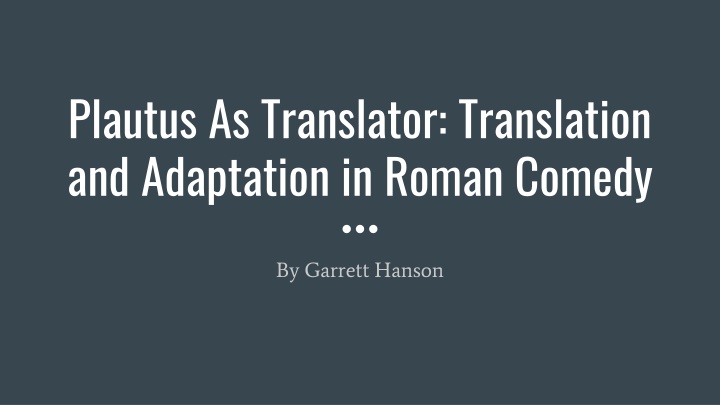
Plautus as Translator and Adapter in Roman Comedy
Explore the translation and adaptation practices of Plautus in Roman comedy, analyzing whether he merely translated Greek New Comedy into Latin or adapted it for a Latin audience. Early attitudes towards Plautus, the concept of contaminatio, insights from Eduard Fraenkel, and distinctive Plautine features are discussed, shedding light on the relationship between Roman theater and Greek sources.
Download Presentation

Please find below an Image/Link to download the presentation.
The content on the website is provided AS IS for your information and personal use only. It may not be sold, licensed, or shared on other websites without obtaining consent from the author. If you encounter any issues during the download, it is possible that the publisher has removed the file from their server.
You are allowed to download the files provided on this website for personal or commercial use, subject to the condition that they are used lawfully. All files are the property of their respective owners.
The content on the website is provided AS IS for your information and personal use only. It may not be sold, licensed, or shared on other websites without obtaining consent from the author.
E N D
Presentation Transcript
Plautus As Translator: Translation and Adaptation in Roman Comedy By Garrett Hanson
Translation vs. Adaptation: On the Translation Practices of Plautus - Is Plautus merely rendering a Greek New Comedy into Latin? - Plautus vortit barbare? Or is Plautus adapting a Greek New Comedy for a Latin audience? If Plautus is drawing from one or more sources, how closely does he adhere to his sources; how does he differ? - -
Early Attitudes - Many early scholars of Roman comedy were unsure how to treat Plautus, whether as a close translator of Greek sources, or as an author taking extreme adaptive liberty. The former would present Plautus as an invaluable source for lost Greek New Comedy. The latter would highlight his creativity as an author. - -
contaminatio: A Writing Process -Friedrich Leo argued for contaminatio to explain the relationship between Roman comedic authors and their Greek sources, with a special emphasis on Plautus. - contaminatio is a process where an author combines material from multiple sources in one play.
Eduard Fraenkel - Fraenkel worked with newly discovered papyri of Menander in 1922, along with comparisons to Terence, to reconstruct the amount of creative liberty that Plautus took with his sources. He found that Terence, while making small structural changes, was far closer in plot to Menander. In contrast, Plautus was found to embellish more, in addition to structural changes. - -
Fraenkels Findings: Plautine Features - - - - - - Amplified and Exaggerated Dialogue Stereotypical Opening Monologue Riddling Identification Puns Formal Language: legal, governmental, and religious Military Language
Roman Theater and Greek Sources: Explanations for Adaptations - At least some of Plautus adaptations can be explained by the features of Roman and Greek theater. Act breaks Chorus between acts Neither feature exists in Roman Drama. Plautus must fill these gaps. Cover monologues Bridge monologues - - - - - -
Roman Adaptation - Further, because Roman comedy often contains songs, the switch in metrical form can act in the same way as a cover or bridge monologue. - Iambic trimeter vs. Trochaic septenarii Menander also prefers to capture the substance of an entrance, rather than manner. Plautus instead focuses on the manner of introduction, and edits parts of Menander to switch entrances and exits for this aim. - -
Dis Exapaton vs. Bacchides: Case #1 (Bacchides 534-9, 559-61)
Notes on Case Study #1 - Iambic Trimeter vs. Trochaic Septenarii (catalectic tetrameter) - Musically Accompanied vs. Spoken Lines cena adventicia is a Roman concept, absent in Menander. Bac. 540-58 are an expansion, moralizing about friendship. - This is a purely Plautine feature Before the discovery of the papyrus, these lines were assumed to be from Menander. - Possible contaminatio Menander focuses on a slightly delayed encounter; not drawn out. Plautus invokes the language of the stage, focusing on the moment; it is self- referential. - - - - -
Notes on Case Study #2 - - These passages show remarkable difference in their aim. Menander focuses in on the potential of what his adulescens will say to his lover. - This broken speech within speech has the actor mimic Chrysis. Plautus extends the soliloquy; internal battle. - His conflicting emotions create space for new jokes, paraprosdokian. The thematic undertone is the same. Each scene serves a different purpose in the narrative. - - -
Conclusions - With all of this in mind, it is clear that Plautus is using his source material with a careful attention to his audience. He translates Menander wholesale, when he can, but makes adaptations for the expectations of his audience. Plautus carefully works around the missing features in his own genre. Plautus is carefully blending New Comedy with native Italic drama to create a vibrant and creative adaptation of older works. - - -
Bibliography Bain, D. 1979. Plautus vortit barbare: Plautus, Bacchides 526 61 and Menander, Dis exapaton 102 12. In Creative Imitation and Latin literature, eds. D. West and T. Woodman, 17 34. Cambridge: Cambridge University Press. Barbiero, E. A. 2016. Dissing the : Comic One-Upmanship in Plautus Bacchides. Mnemosyne 69: 648-67. Christenson, D. 2020. Plautus: Pseudolus. Cambridge: Cambridge University Press. Clark, J.R., 1976. Structure and Symmetry in the Bacchides of Plautus. Transactions of the American Philological Association 106: 85-96. Damen M. 1992. Translating Scenes: Plautus Adaptation of Menander s Dis exapaton. Phoenix 46: 205 31. Damen, M., 1995. By the Gods, Boy Stop Bothering Me! Can t You Tell Menander from Plautus? or How Dis Exapaton Does not Help us Understand Bacchides. Antichthon 29: 15-29.
Bibliography (cont.) Fontaine, M. 2014. Between Two Paradigms: Plautus. In The Oxford Handbook of Greek and Roman Comedy, eds. M. Fontaine and A. Scafuro, 516-37. Oxford: Oxford University Press. Goldberg, S. 1990. Act to Action in Plautus Bacchides. Classical Philology 85: 191 201. Lloyd, R.B., 1963. Two Prologues: Menander and Plautus. The American Journal of Philology, 84: 146-61. Maurice, L., 2013. Contaminatio and Adaptation: The Modern Reception of Ancient Drama as an Aid to Understanding Roman Comedy. Bulletin of the Institute of Classical Studies, Supplement: 445-65. Owens, W.M., 1994. The Third Deception in Bacchides: Fides and Plautus' Originality. The American Journal of Philology 115: 381-407.





